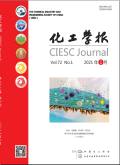化工学报2024,Vol.75Issue(3):760-767,8.DOI:10.11949/0438-1157.20240020
基于亚锡灭活及链端改性提高聚乳酸热稳定性的研究进展
Research progress on improving thermal stability of polylactic acid based on stannous inactivation and chain end-group modification
摘要
Abstract
Polylactic acid(PLA)is the most commercially available synthetic biodegradable material at present,with good mechanical properties and excellent biocompatibility.Stannous catalysts have been widely used in the industrial production of PLA because of their high catalytic activity,low price and low racemization reaction.Although the usage of stannous catalysts is tiny,the trace residue of the catalyst still promotes the thermal degradation of PLA products,and then greatly affects the performance and service life of the products.Therefore,this paper initially reviewed the mechanism of promoting thermal degradation of PLA by stannous catalysts,and then summarized the research progress on improving the thermal stability of PLA in detail from three aspects,such as stannous ion chelation,oxidation of stannous ion and chain end-group modification.It is expected that this review can provide a guideline for extending the service life of PLA products and expanding the application range of PLA products.关键词
聚乳酸/催化剂/失活/氧化/螯合/端基改性/耐热性能Key words
polylactic acid/catalyst/deactivation/oxidation/chelation/end-group modification/heat resistance分类
化学化工引用本文复制引用
陈志明,王泽凤,马高琪,王良波,余承涛,潘鹏举..基于亚锡灭活及链端改性提高聚乳酸热稳定性的研究进展[J].化工学报,2024,75(3):760-767,8.基金项目
国家自然科学基金项目(52103020) (52103020)
浙江省自然科学基金项目(2022C01049) (2022C01049)

